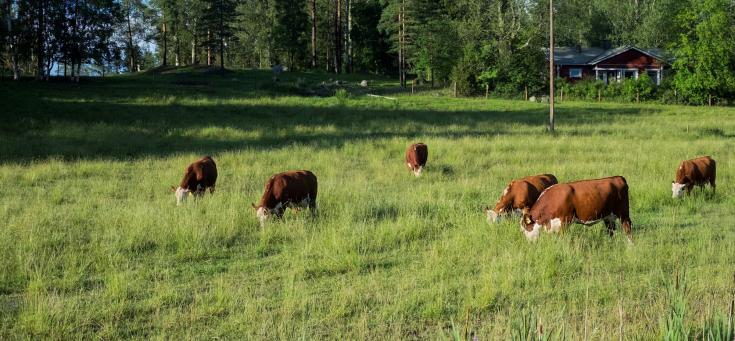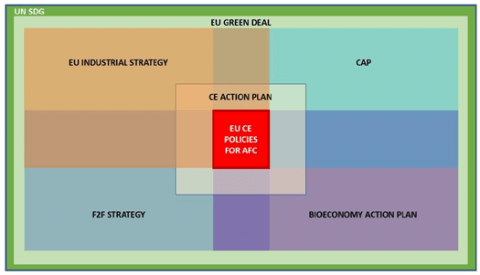Circular economy in the agri-food sector

A strategic sector for the European Union – today and the future
The strategic importance of the agri-food sector for the European Union can hardly be better underlined as by the EU’s common agricultural policy (CAP), which represents about 36% of the overall budget of the EU. The agri-food sector has a strong cultural and social importance, taking into account Europe’s strong tradition and the contribution of the sector for keeping rural economies alive and maintaining rural areas and landscapes across the EU. It has also become an industrial sector competing on the global level.
The European Innovation Partnership for Agricultural Productivity and Sustainability (EIP-AGRI), which fosters competitive and sustainable farming and forestry and the EIT Food, a large European food innovation initiative, supported by the European Institute of Innovation and Technology (EIT), working to make the food system more sustainable, healthy and trusted, illustrate the central position of the agri-food sector in Europe’s industrial and innovation strategy.
Why an E-book on the circular economy in the agri-food sector?
Since at least the middle of the 20th century, agriculture has become a “largely mechanised industry, which uses a lot of chemicals, mechanical and energetic inputs to produce increasing amounts of food.” (Source SinCE-AFC Agri-Food Circular Economy E-book). The related food manufacturing, distribution and food consumption have generated multiple economic activities on a global scale. “The whole set of those interrelated activities represents what is usually defined as Agri-Food Chain (AFC).” (Source SinCE-AFC Agri-Food Circular Economy E-book)
As for other sectors of the economy, the agri-food chain is facing the challenges of the ongoing digital and green transition. Considering the heavy ecological footprint of agriculture and the growing needs of an increasing world population, the actors in the sector are increasingly considering the principles of the circular economy for developing a more sustainable and resilient agri-food industry.
The Interreg Europe project SinCE-AFC - Enhancing the Entrepreneurship of SMEs in Circular Economy of the Agri-Food Chain has the mission to involve SMEs of the Agri-Food chain in circular economy through the promotion of the appropriate managing and financial horizontal mechanisms.
To fulfil this objective, it appeared necessary to frame the concept of circular economy, as a large part of SMEs in the agri-food sector still lack motivation and support to engage actively into a circular transformation of their activities. The SinCE-AFC Agri-Food Circular Economy E-book has been drafted in order to provide relevant stakeholders with a comprehensive overview of some key aspects for the circular transformation of the agri-food sector. As Ms. Vaso Papadopoulou, representative of ANATOLIKI S.A., the Lead Partner of SinCE-AFC, formulates it: “It is important to help businesses understand that circular economy is primarily about business models that will help them become more competitive.”
What is in the Agri-Food Circular Economy E-book?
The E-Book covers the following topics:
- Impact of the Covid-19 pandemic on the agri-food chain: threats and opportunities.
- Definition of circular economy: the concept of circular economy is complex and not always clearly defined. It includes or is connected to other related notions such as “bioeconomy”, "industrial symbiosis", “industrial design”, “industrial ecology”, “collaborative consumption”, etc. The E-Book aims to bring clarity to those concepts.
- European policy framework: as outlined in the introduction, the agri-food sector is addressed by several European policies. The E-book helps to identify the most relevant ones with respect to the circular transformation (EU Green Deal, CAP, European Industrial Strategy, Farm to Fork Strategy, Bioeconomy Action Plan, Circular Economy Action Plan) and their interaction.

Source: SinCE-AFC E-Book, own depiction from the authors
- Drivers and barriers for the implementation of a circular economy in the agri-food sector, including regulatory, market, technological, and cultural factors.
The current form of the e-book is the result of a study based on a literature review and institutional data sources consultation about Circular Economy (CE) implemented by Stefano Spillare and Francesco Savoia, researchers at the University of Bologna. They see the e-book as a "work in progress", which shall be complemented with the good practices identified by the SinCE-AFC partners and in a further step by the upcoming partners’ action plans.
Have a look also at the policy brief on
published by the Interreg Europe Policy Learning Platform, which provides an overview of practices and policies adopted in different European countries.
